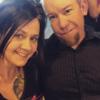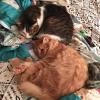Search the Community
Showing results for 'revision'.
Found 17,501 results
-


Revision scheduled February 21st!
Kimb497 replied to Kimb497's topic in Revision Weight Loss Surgery Forums (NEW!)
I totally understand. I'm also very worried about strictures and possible dumping. I've been very fortunate with my sleeve, besides having reflux, which is actually manageable with medications, but I don't want to be on these for life as they can also cause problems with long-term use. I recently tried stopping them for a couple of days just to see if I really needed to have this revision. Even just oatmeal was causing me to reflux, so I guess it is the best thing for me right now. I will also miss being able to use ibuprofen occasionally for aches and pains. I didn't start using it until about a year out from sleeve, and it's not even once a week, but sometimes it's the only thing that really helps. Best of luck to you! -


August 2023 Surgery Buddies!
Hapamomma replied to kayhay0714's topic in PRE-Operation Weight Loss Surgery Q&A
I have my sleeve revision to bypass on 8/11! -
Hummm. I was thinking that maybe if they do change it then it would be smaller for me because I swear my sleeve was left too big from day one. The surgeon thinks I just have fast gastric emptying and that’s why I feel like I can eat more but I hope we will know for sure when he does the scope in a couple of weeks. It will be nice if I do finally get an answer as to why I was always able to eat more than everyone else. I was just thinking that even though statistics say I will lose more with SADI revision that I may be differnt if one involves changing the stomach and the other does not.
-
I don't think there's really a difference in how much you can eat. At first you probably won't be able to eat as much because you'll be swollen from the surgery for awhile, but after that - I don't think so because I've known several people who've had revisions, and I don't remember people mentioning that.
-


August 2023 Surgery Buddies!
kayhay0714 replied to kayhay0714's topic in PRE-Operation Weight Loss Surgery Q&A
Thank you so much for that information! I've been looking for a good protein shake for a while so this is super helpful 🙂 I hope your revision went well! -


Sleeve to bypass question
SleeveToBypass2023 replied to ShoppGirl's topic in Gastric Bypass Surgery Forums
As you know, I had the sleeve to bypass revision. They do make your pouch a little smaller, but it will stretch out a little as time goes on. I noticed I have more of a hard stop with the bypass versus the sleeve, and I definitely have to make sure I chew thoroughly and eat slowly way more with the bypass. You can lose weight with a revision, but not nearly as much and not nearly as fast as with the original surgery. You also have to take accountability for what you eat and how much. If you're eating slider foods and stuff not compliant with your diet, if you're grazing all through the day, if you're not watching your salt, sugar, protein, carb, and fluid intake.....no surgery is going to fix the problem. -


Dr. Ariel Ortiz at the OCC
Angie Cortes replied to Kindle's topic in Mexico & Self-Pay Weight Loss Surgery
I didn't have to pack anything like. I had a revision and had to be there for 5 days. In those 5 days I had to go to the clinic each morning and they cleaned and took care of all bandages. -


Dr. Ariel Ortiz at the OCC
BrendaBixler replied to Kindle's topic in Mexico & Self-Pay Weight Loss Surgery
As you know VegasOne I will be there the 28th, surgery the 29th and I will stay two nights at hospital due to me having lap band to sleeve revision. So I will be at hotel day of your surgery. We are scheduled to leave on the 3rd. How are you doing so far on the preop diet? My husband is struggling but hanging right in there. He's lost 17 in a week on the phase1 Atkins diet. Next week starts his 2 weeks of liquids. Eeek!! That's going to be rocky two weeks in our household!! -


Dr. Ariel Ortiz at the OCC
Nurselori replied to Kindle's topic in Mexico & Self-Pay Weight Loss Surgery
Yes Brenda, I am having my surgery at the OCC on the 29th as well. I am a revision also, My band was removed several years ago though. I was originally scheduled for an October date but was going crazy so I got it changed. I have been on a huge roller-coaster of emotions and I just want to get it done already. I'm so excited yet scared too. That's to be expected I guess. My husband is not supportive of the surgery but so far he is planning on coming. We live in WV and will be flying in to San Diego on the 28th. What about you guys? are you coming in the 28th? Great to meet someone with my date. It'll be nice to have someone on the exact same timeline to chat with and compare notes so to speak. -


Dr. Ariel Ortiz at the OCC
back2barb78 replied to Kindle's topic in Mexico & Self-Pay Weight Loss Surgery
First off, I'm so glad your hubby is completely on board- he's the person that's in the house with you and will be the person you really need on your side. As far as the other people in your life, they can have a seat. Your adult choices-especially ones you're making to benefit your health- are none of their business, especially your boss! How does she know what's right for you? Has she been a friend your whole life and is she there through all your weight struggles? On top of that- this sleeve is NOT easy. It's easier to do weight watchers and have a day where you "cheat" then get back on the wagon. But what would happen-your weight would continue to fluctuate up and down and you would be in the same position or worse this time next year. Right now if I didn't have my sleeve and I was doing some other program, I GUARANTEE I would've cheated and had something I wasn't supposed to. Having the sleeve and knowing something may possibly make me sick is deterrent enough for me- that was part of my personal reasons for getting the sleeve in addition to weight loss and having something in place to help me keep off/ control weight gain long term. The people who are saying these things to you should do some research on the sleeve before they chime in on what you should/shouldn't be doing. I would be willing to bet if you countered their opinion by asking them what they know about the surgery they couldn't even tell you what it is. And for sure the weight doesn't just fall off- you still have to work out to see good progress. Your supposed to exercise 60-90 minutes daily with this in addition to trying to drink all your water, all your protein, and take all the vitamins. Some people get the surgery and lose a small amount of weight and then nothing else (now that we're all together, I came upon a sleeve to bypass revision thread). Easy- I definitely don't think so. -


Dr. Ariel Ortiz at the OCC
HoosierGirl replied to Kindle's topic in Mexico & Self-Pay Weight Loss Surgery
When researching, the idea of the plication was appealing. I ultimately chose the sleeve for the following reasons: 1. The sleeve is permanent. I didn't want something temporary that could cause issues in the future. Also didn't want to have to have to self pay for a revision surgery if needed it in the future. After all my research on weight loss surgery, I didn't want to have multiple surgeries in case the temporary first surgery failed. 2. By removing the part of the stomach where the hunger hormone is produced, I was hoping to reduce my crazy appetite. 3. The plication is a newer procedure and I wanted to have something with a little more of a track record. Plus, this isn't a common surgery in the US. So if there was a complication that needed urgent attention, I wasn't sure help would be readily available. Good luck in your research. Being an educated patient will pay you big dividends! -
Let's face it - I thought the sleeve was insane until after six months of lurking on LBT I saw how many revisions and miserable people were there. A procedure with a massive complication rate and shoddy % EWL stats is being phased out by the market because surgeons and patients are doing research? Say it ain't so!! And I'm sick of the "sleeves stretch" rhetoric. Yes, they stretch. MINUTELY and IF YOU MAKE THEM STRETCH. Ya know, with work, with regular overeating to the point of pain over a long period of time. But people act as if it becomes a damn football field if you slip up twice. Hardly the case. Anyway, there's enough people on the sleeve forums I want to go away, so I don't venture into other forums as a general rule. I try to limit the stupid in my life. ~Cheri
-


Is something wrong with me?
limesqueeze23 replied to KariLovesColorado's topic in Gastric Bypass Surgery Forums
My best friend has this problem as well. She is 7 months post op and she can eat a like a 'normal' person already. She was starving and able to eat a lot more post op than what the nutritionist and surgeon told her to expect. The surgeon actually offered to revise her bypass and make her pouch smaller and she declined. Sent from my iPhone using the BariatricPal App -
I was scheduled to have a lap band revision on June 22nd to move to the sleeve. Life had other plans! I found out yesterday that I am pregnant! I am very excited, but also surprised as we were not trying (but we also were not trying). I currently have the lap band, and have had it for years. Anything I need to be aware of?
-
Me too!!! this will be a revision for me- VSG to RNY because of GERD and because I'm fat again...
-
Still in the game! After revision i was counseled that i may lose a little more so im STILL trying to maintain in the 150s. Im 151 lbs currently and about 19 days post op. Not too rapid so I'm satisfied.
-
Welcome back, though I’ve been gone a while and only just found out you had a surgery! Did something happen to prompt the revision?
-


February 2022 Surgery Buddies
Percheronfan replied to MeganMyers's topic in PRE-Operation Weight Loss Surgery Q&A
February 2nd was my day. So far, minimal pain. Nothing needed more than Tylenol. I’m surprised. I had the revision from the sleeve to the roux-en-y. Best decision I’ve made ever for myself. This is definitely different in feelings for food-not hungry even the slightest and still cooked breakfast for my Mr with no nausea or desire for a bite. I’ll be full liquid diet for 2 weeks. After the sleeve I kept saying I was hungry and they called it head hunger, I tried to convince myself that’s what it was, lol, but no-i was genuinely hungry. Now working on 64 ounces of water a day and taking my needed meds throughout the day so I can get them all in. Need 60-80 grams protein but not there yet. 10 grams is all I’ve gotten in since surgery. Have been reads it this is only temporary and I’ll be able to drink more of the protein drink eventually. I’ll be honest, the stings from the shots to prevent blood clots is worse than my belly pain. I’ll do those for two weeks twice a day. Done in Iowa and so excited. Oh and I’m in a wheelchair because of fractures in my pelvis. Got an upright walker and am able to start taking steps!! It’s all so new, I’m loving the excitement this has brought with it. Good luck everyone!!! -


February 2022 Surgery Buddies
Toggletrue replied to MeganMyers's topic in PRE-Operation Weight Loss Surgery Q&A
I’m wondering if there is a fee for any form of Revision Bariatric surgery? And if so do most insurances cover? -
I am here I just have been dealing with Plastic Surgery issues. Now the doc that I was going to in Portland called me with the revised price and it is up to 13500$ I can't afford that at all. So I am going to the consult with the doc in town tomorrow. They were good enough to push the consult up so that I could figure out the financing issues. This seriously has been a bumpy ride. Then there is the fill issue. I am sure that my tummy is inflammed from the pb'ing issues yesterday but I could hardly get anything down today. I didn't eat my lunch but had crackers instead because they would go down. I may have to break down and go get more of an unfill because I don't know that I can keep this up until June. But on a good note I did just get my wedding pictures, so when I get home I will put them together in a collage and post them. They aren't great, but the do show how much fun we had. Just so you know, my DH doesn't like to smile for pictures!
-
So it is Saturday morning weigh in day! 4 pounds gone. Maybe I will be at revised goal by the time I get this fill removed! Going to go in during spring break which is not this coming week but the following. Well we are going to head out and do something. I don't want to sit in the house all day!
-
Hi all u Aussies! I'm from the Gold Coast. I have had a band for 14 yrs and am having it revised on Tuesday! Omg I'm do excited! I'm actually going to Mexico! I went to the doctors here and they wanted $25000 to do the revision! I got an early release of my super and I'm getting it done in Mexico for a total of $6000 including flights for me and my partner. I have done extensive research and I'm not worried at all. I suppose because I have had surgery in Bangkok also I sort of know what to expect. I'm glad I found some more Aussies on here!
-


Attention ! Australian Sleevers
one_elle26 replied to Lavea's topic in Gastric Sleeve Surgery Forums
Hi kelliv, I am having a Bypass for a couple of reasons: I have had 2 x Lapbands which have slipped and I am having the second one removed in 2 days time. I have also had my Gallbladder removed during that time. I injured my back and both shoulders at work and I have had reconstructive surgery to my foot and today I was told that I have acute arthritis in that foot which I can hardly stand on at the moment, so exercise is going to be difficult post op. My Surgeon and I discussed my options and he feels that when he does the WLS it will be the 4th stomach operation that I have had, this means that I have a much higher risk of developing Scar tissue around my stomach, I need to lose at least 50kg and his statistics show that a Bypass should be more successful than a sleeve, he believes that if I have a 'sleeve' he will have to revise it in 2 years so he recommended doing a Bypass as the first option, I have a complicated medical history which includes lung clots last year and I am 57. So, after weighing up all the pro's and con's we decided that I would have a Bypass. I really like this forum and there doesn't seem to be a similar one for 'Bypassers' so I hang out in here. Hope you don't mind???? You all have amazing stories and insight into WLS and I have learnt a lot from this forum. -


Dr. Gerald Kirshenbaum - Considering Dr. Kirshenbaum
Shesha replied to Shesha's topic in Weight Loss Surgeons & Hospitals
Hi All!! I have been very busy lately. No time to post. Well, I still have a flipped port. I can't get in to have it fixed before Dr. K goes to Africa, so I have to wait until JULY 23rd!! I am so disapointed. I haven't lost a pound in about 3 weeks! He did say that he would try doing the port revision under a local. Yay me! I am, however, bringing my sister along with me, just incase they have to revert to a standard anthestetic. Not much else going on... Keep on keepin' on!:eek: -
If you would like to keep in touch with me that would be great. My date is the same Im doing revision band to bypasd. Sent from my SM-G930V using BariatricPal mobile app











